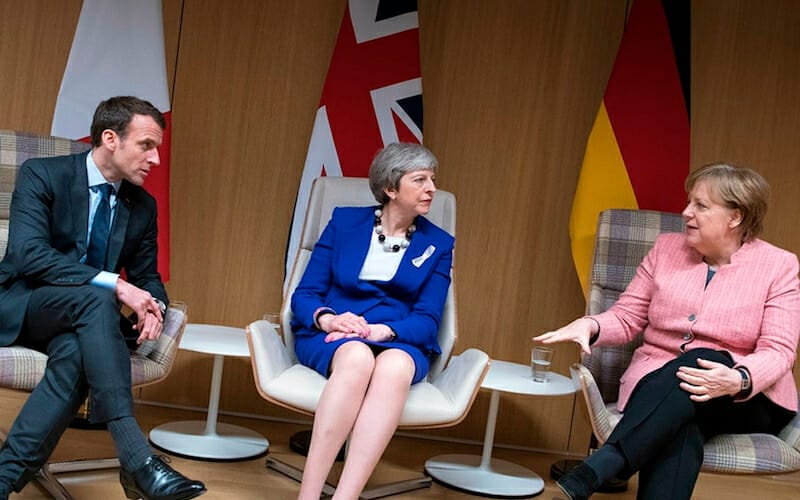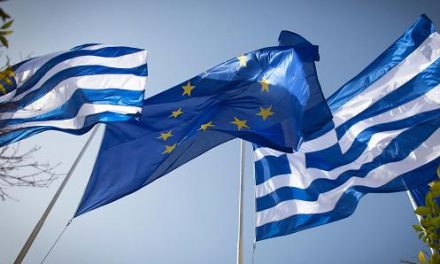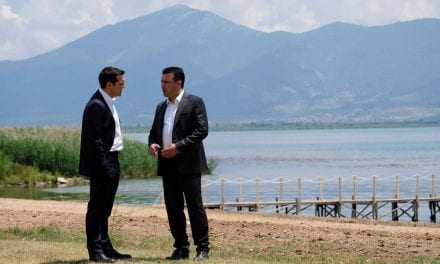By International Policy Digest
Europe is pretending to be acting forcefully against Russia, and the news media are falling for it, such that they’re ignoring the lack of any material consequences for Russia.
On Friday, the EU’s member states agreed with Britain’s request to condemn Russia for what Britain characterizes as the Russian state’s attempted murder of a defector (Sergei Skripal) and his daughter, and several British first responders, on British soil on 4 March. The EU Commission President (Jean-Claude Juncker) said: “This is an extraordinary measure – we have never taken it before.”
The EU Council President (Donald Tusk) said that “the EU has demonstrated unanimity and solidarity with the UK in the face of this attack.”
The Daily Telegraph newspaper entitled its report: “How Theresa May finally persuaded the EU to unite against Russia.” The Financial Times reported: “Britain needs its allies in Europe more than ever.” The Daily Mail hailed May’s “victory.” I don’t know why The Sun newspaper – that much maligned tabloid – should be alone in warning Theresa May that European solidarity won’t last beyond the weekend, when the EU returns to its hard-nosed conflict with Britain over Brexit.
So, please everybody in the news media and their consumers, let’s hold the euphoria, show some objectivity, and reconsider what really happened: the EU united – and then agreed to withdraw its Ambassador from Moscow. So what?
Ten days earlier, Britain had already expelled 23 Russian diplomats; then Russia expelled 23 British diplomats. Do we think Britain is reeling? Of course not. Britain isn’t reeling from Russian expulsions, so why are we indulging the political spin that Russia must be reeling, feeling defeated, humiliated, cast adrift with its intelligence network ruined, finally brought to account for years of violations of international law and human rights, quaking in its boots, when the EU withdraws its Ambassador, who never appears in the news otherwise?
The EU did not recommend that its members should withdraw their ambassadors, by whom all the EU’s real business with Russia gets done. The EU did not recommend that members should expel any Russian diplomats, although some member states have said they will. The EU did not agree to impose any material sanctions on Russia.
The EU has done nothing of any material consequence to Russia; in that, the EU is following the British government’s example. The EU and Britain are playing a pantomime of over-acted outrage and fluttering handkerchiefs to distract from what they have chosen not to do, such as sanctions, or a designation of state-terrorism, which would lead to sanctions.
Let’s remind ourselves of the accusations levelled by Britain and now agreed by the EU: certainly, what happened in Salisbury on 4 March was at least attempted murder; the primary two victims remain in comas caused by a rare chemical weapon. According to Britain, that is state-sponsored attempted murder: May told Parliament of an “unlawful use of force by the Russian state against the United Kingdom.”
I had already coded this attack as “state-terrorism”: if a state wants to kill somebody, it can do so in much stealthier ways than with a nerve agent; nobody needs to use a nerve agent unless they mean to terrorize other dissidents; and this particular nerve agent was of peculiar Russian vintage, as if Russia wanted to be identified. This wasn’t just murder, it was a murder meant to terrorize a larger audience. It was state-terrorism.
At least 14 deaths occurred on British soil from 2003 through 2015 that the US intelligence community suspected of Russian involvement, but that British authorities have closed as suicides, accidents, or unexplained, excluding the murder of Russian dissident Alexander Litvinenko in 2006 by polonium (a radiological material). The inquest concluded that the Russian president himself (Vladimir Putin) was probably behind it, and indicted the two agents who met with the victim on the day.
Thus, Britain has now accused Russia of at least two cases of state-terrorism using a banned material on British soil, but without designating Russia as a terrorist state.
These two cases are not the only cases of Russian illegal activities in foreign spaces. Russia has been accused of offensive cyber warfare against the Balkan States during diplomatic conflicts, against Georgia during war in 2008, against Ukraine during war in 2014, and during the US national election campaigns in 2016. Now we learn that Russia used thousands of bots to confuse the news media about the nerve agent attack in Salisbury.
Given Britain’s accusations, Russia should join the ranks of the most pariah nation – North Korea, which, like Russia, has been accused of offensive cyber warfare (such as the attacks on Sony Pictures in November 2014, in advance of Sony’s release of a satirical movie about North Korea) and of state-terrorism usinga nerve agent (in February 2017 on Malaysian soil; the victim was the estranged brother of the North Korean leader). In November 2017, the US returned North Korea to the list of state sponsors of terrorism, after nearly 20 years off the list.
Yet Britain and the EU have done nothing more than move diplomats in response to the latest Russian outrage. Why? They are putting short-term economic self-interests before long-term international security.
The sanctions regime that Europe imposed on Russia following its invasion of Crimea in 2014 is laughably weak. As recently as February 2018, Britain’s Security Minister told a newspaper that the British government wanted to crack down on Russian criminals and corrupt politicians in Britain, who launder about £90 billion of illegal funds in Britain per year. Britain has not executed such a crackdown, and has not asked the EU to consider such a crackdown, and the EU has not considered such a crackdown.
The Financial Times reported on the day after the EU conference that expatriate Russians in Britain fear a decline in British amiability – but they don’t expect is any intervention in their financial flows.
France and particularly Germany (the most powerful members of the EU) have acted as apologists towards Russia, partly because they are more dependent than most EU members on Russia’s energy exports, particularly since they curbed their strong nuclear energy industries in response to the accident at Fukushima Daiichi, Japan, back in 2011. These are the same member states that did nothing in the nearly three weeks between the attack and the EU conference. France and Germany both said they would reserve judgment until Britain provided samples for independent tests – after Russia made the same demand.
So, here we go again – European politicians once again prove that they put unity before security.













